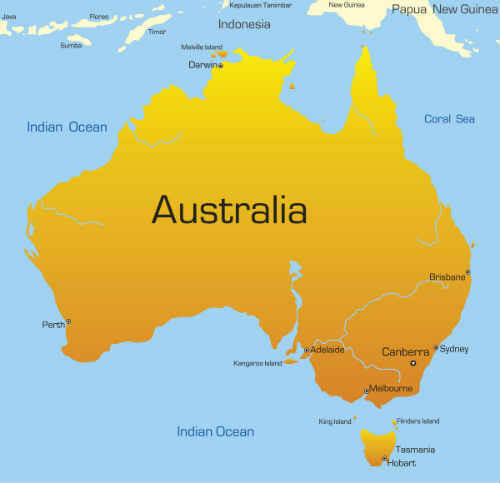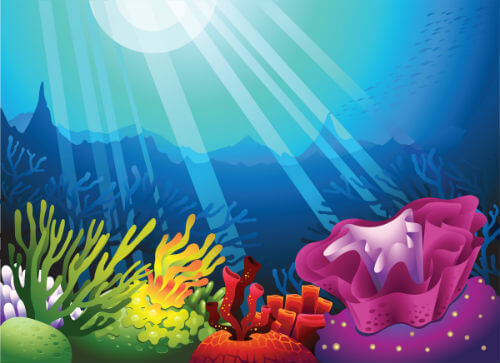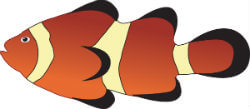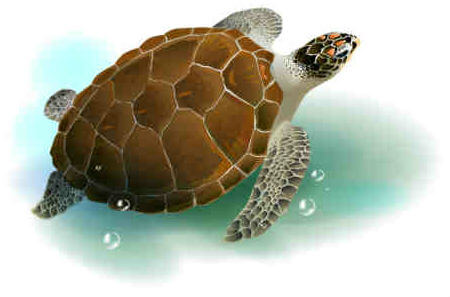English Reading Practice
Australia
Australia is a country in the south Pacific Ocean. It is also one of the seven continents of the world. A "continent" is a very large piece of land. Australia is the world's sixth largest country and is nicknamed the world's largest island.

Australia has many different types of climates. There are rain forests (areas with trees and lots of rain), mountains, and grasslands. Most of Australia, however, is desert.
While desert is the primary climate on land, the ocean climate is quite the opposite. Just off the coast of Eastern Australia lies one of the most impressive and beautiful wonders of the world: the Great Barrier Reef.
The Great Barrier Reef
The Great Barrier Reef is the world's largest coral reef. "Coral" is a kind of animal that lives in the sea that looks like a plant. A "coral reef" is a group of coral that are connected together to form a wall. The Great Barrier Reef is 1600 miles long and can be seen from space. It is home to approximately 900 islands, many of which can be visited or lived on.
Coral reefs provide shelters for marine (sea) animals. A "shelter" is a protected area or home. The Great Barrier Reef is home to an incredible number of marine plants and animals. The reef is home to over 1500 different kinds of fish alone. One of the most well-known kind of fish that lives on the reef is the clownfish.

In addition to fish, many ocean mammals live in the Great Barrier Reef. A "mammal" is a kind of animal that doesn't lay eggs. Humans are mammals. Some of the mammals that live on the reef are dolphins and whales.
There are also six different kinds of turtles that live on the reef, making it one of the most important breeding grounds for turtles. A "breeding ground" is a place where animals get together to have babies or lay eggs.

Many of the fish, animals, plants, and birds that live on the Great Barrier Reef are endemic to the reef. "Endemic" means that that is the only place that they live. This means that the reef is a very important place that is important to protect. As long as the reef is healthy, life can flourish. "Flourish" means get bigger and be happy.
Australia understands the importance of the Great Barrier Reef and has implemented (put in place) many programs to protect the reef. Much of the reef is a national park, which means that fishing, tourism, and other activities are monitored (watched). There are also many research programs going on to help scientists understand the reef and how to take care of it. These programs allow not only Australia but the whole world to appreciate and protect this beautiful natural wonder.
And now, practice:
Australia - Exercises
Vocabulary Questions
1. What does "marine" mean?a) air
b) land
c) sea
d) space
b) land
c) sea
d) space
2. What does "species" mean?
a) type
b) mammal
c) fish
d) bird
b) mammal
c) fish
d) bird
3. What does "monitored" mean?
a) put in place
b) watched
a) stopped
b) got bigger
b) watched
a) stopped
b) got bigger
Grammar Questions
1. The Great Barrier Reef is _________ world's largest coral reef.a) a
b) the
c) an
d) that
b) the
c) an
d) that
2. Coral reefs _________ shelters for marine animals.
a) provide
b) provides
c) has provided
d) will provide
b) provides
c) has provided
d) will provide
3. There are also six different kinds of turtles that live _________ the reef.
a) in
b) at
c) on
d) of
b) at
c) on
d) of
Comprehension Questions
1. How long is the Great Barrier Reef?_______________________________________________________________
2. How many kinds of fish live on the Great Barrier Reef?
_______________________________________________________________
3. What activities are being limited on the Great Barrier Reef?
_______________________________________________________________
Get Updates, Special Offers, and English Resources
Download your FREE GIFT (the first two chapters of
English Short Stories Book and Workbook)
as soon as you join!

By submitting your email, you consent to receiving updates and newsletters from us and to the sharing of your personal data with third parties for the purposes of sending you communications. We will not spam you. You can unsubscribe at any time. For more information, please see our privacy policy.




